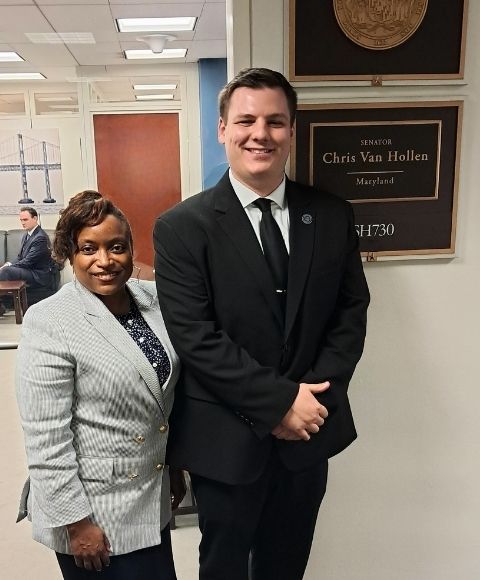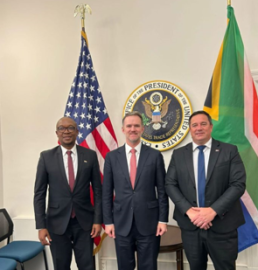ASBMB members call for funding and agency support amidst uncertainty
Last week, 22 American Society for Biochemistry and Molecular Biology members convened in Washington, D.C., for the society’s annual Capitol Hill Day. Their mission: defend basic science in the face of growing threats to research funding and agency restructuring and urge policymakers to invest in innovation.

Ann West
Ann West of the University of Oklahoma, Ann Stock of Rutgers University and ASBMB CEO Mona Miller visit the office of Rep. Tom Cole (R-Okla.) and meet with Staffer ID at the U.S. Capitol.
“These meetings are about more than opposing cuts,” ASBMB CEO Mona Miller said. “They are about stating clearly what we support, which is sustained funding for our key federal science agencies. We need a federal budget that reflects the scale of our national challenges and the promise of scientific research to help solve them.”
In conjunction with Hill Day, ASBMB’s letter-writing campaign and request-a-congressional-meeting campaign kicked off to help researchers across the country make their voices heard. Efforts are ongoing, including an upcoming webinar on local congressional meetings, May 22 at 11 a.m.
Scientists face significant delays in receiving grants from the appropriated funds for fiscal year 2025, stalling research programs and halting crucial studies. President Trump’s fiscal year 2026 budget cuts funds for the National Institutes of Health by 40 percent and the National Science Foundation by 57 percent. The last time the NSF budget was this low was fiscal year 2001, during President George W. Bush’s first administration. The budget also proposes agency restructuring that could eliminate critical areas of research. Institutes specializing in nursing research, alternative medicine, minority health, and global health research are proposed for elimination. Of the 20 institutes that would remain, the proposed budget consolidates 15 into five newly formed institutes focused on body systems, neuroscience, general medical science, disability and behavioral health.
“If enacted, the president’s proposed cuts will dramatically slow U.S. medical research and innovation, taking away health and hope from Americans,” Research!America President and CEO Mary Woolley said in a press release. “Childhood cancer, Alzheimer’s, Lupus … name a health threat, and this budget would neglect it.”
ASBMB Advocacy Training Program delegates spoke to legislators on the Hill about how budget cuts increase the vulnerability of early-career researchers, emphasizing that cuts undermine the next generation of innovators. According to ASBMB, recent cuts decreased NIH-sponsored research training programs by 55%, eliminating all training programs for community college students, undergraduate students, master’s students and postbaccalaureate scholars. Graduate training programs have been cut in half, and a third of all postdoctoral programs have been terminated. Without these training programs, the U.S. risks falling behind in scientific competitiveness and innovation.
ASBMB’s 2025 Capitol Hill Day came at a critical moment. As of May 2025, the Trump administration held back $1.7 billion in funding to begin or continue research and canceled more than 300 NIH grants. According to a list provided by NSF’s union representative, between April 18 and April 25, 2025, NSF canceled more than 1,000 active research grants. ASBMB members told lawmakers that now is the time to invest in science, not scale it back.

Jeff Wilusz
Jeff Wilusz of Colorado State University and Payton Stevens of Miami University meet with Sen. Jon Husted (R-Ohio) on Capitol Hill.
“We understand the pressures on the federal budget, but scaling back support for science now could have lasting consequences for innovation, public health, and economic growth,” Sarina Neote, ASBMB director of public affairs, said. “Scientific research uplifts all communities, and Congress needs to hear from scientists on what happens if you take away this critical pipeline of science funding.”
In 60 meetings with lawmakers and staff across Congress, scientists advocated for protecting the future of fundamental research, supporting the next generation of scientists and ensuring the U.S. remains a global leader in innovation. ASBMB members met with offices on both sides of the aisle, including key offices such as Sen. Susan Collins (R-Maine) and Sen. Elizabeth Warren (D-Mass.), as well as Rep. Tom Cole (R-Okla.) and Rep. Joe Neguse (D-Colo).
“It was a great opportunity to advocate for bipartisan support for research funding,” Ann West, chair of ASBMB’s Public Affairs Advisory Committee and professor of chemistry and biochemistry and the associate vice president for research and partnerships at the University of Oklahoma, said.
ASBMB provided these funding requests:
“ASBMB Capitol Hill Day 2025 was an incredibly significant experience and a key opportunity for PAAC members like myself to engage in public policy, meet with our congressional representatives and do our best to advocate for funding of fundamental biomedical research,” Steve Caplan, professor of biochemistry and molecular biology at the University of Nebraska, said. “Support for fundamental research in today’s political environment should not be taken for granted.”
To support ASBMB members, the society created a comprehensive online resource library designed to help scientists write a letter to congress, schedule a local congressional meeting, share their story and more.
“While we’re always here advocating on behalf of research, Congress needs to hear from their constituents who are on the ground doing the work,” Neote said. "I urge all ASBMB members to advocate for science in their home districts.”
Members of Congress heard directly from scientists about the consequences of funding instability, including lost grants, canceled student programs and lab shutdowns. For example, many summer programs through NSF have been cancelled at universities across the country. For students whose home institutions aren’t major research universities, summer programs represent a gateway to graduate school.
“It was important to share our stories of why science matters and why all scientists need to be telling their elected officials about the impact that the current situation in D.C. is having on real lives,” Joseph Jez, PAAC member and professor of biology at Washington University in St. Louis, said.
Sarah Smaga, PAAC member and executive director of the NSF Center for Genetically Encoded Materials, echoed this sentiment, emphasizing the broader responsibility shared by the scientific community: “It is incumbent upon scientists to articulate the value of the work we do and its importance to our legislators.”

Allison Frick
Sarah Smaga of the NSF Center for Genetically Encoded Materials and Karen Lewis of Texas State University meet with the office of Rep. Lateefah Simon (D-Calif.) on Capitol Hill.
Elisabeth Marnik, a 2024 ATP delegate and director of science education and outreach at the Mount Desert Island Biological Laboratory Biological Laboratory, said the current political climate could foster antiscience sentiments.
“Science saved my life,” Marnik said. “We’re not just at risk of losing critical discoveries. We’re at risk of losing an entire generation of future scientists.”

Allison Frick
Shantá D. Hinton of the College of William & Mary and Brendon Davis, a Ph.D. candidate at Johns Hopkins University, meet with the office of Sen. Chris Van Hollen (D-Md.) at the U.S. Capitol.
She added: “Science is at the heart of everything around us. As a scientist and a mother, I can’t standby in silence. My children’s future, and the future of countless others depends on the discoveries and opportunities science makes possible.”
ASBMB’s Capitol Hill Day is part of a larger strategy to engage and empower the scientific community. Members across can participate in the letter-writing campaign to Congress urging them to support fundamental scientific research:
“This has been the most important ASBMB Hill Day that I have participated in,” Shantá D. Hinton, PAAC member and professor of biology at the College of William & Mary, said. “It is necessary to advocate for fundamental scientific research to ensure that our nation remains competitive and innovative.”
Miller said ASBMB will continue to call on Congress to reject harmful cuts and invest in the research and talent that fuel American progress.
“We are not only defending science, but we are also working to secure its future,” Miller said. “Every member has a role to play. By writing letters, meeting with lawmakers and sharing personal experiences, our community is helping protect research, support the scientific workforce and ensure continued innovation.

Allison Frick
Olivia George University of Hawai'i–West O'ahu of and PAAC member Mary Lipton pose for a photo outside the U.S. Capitol building.







